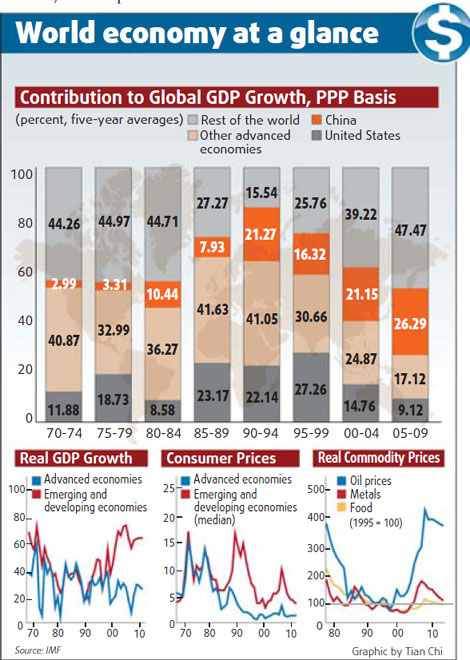
|
CHINA> National
 |
|
IMF: Growth to fall from 9.3% to 8.5%
(China Daily)
Updated: 2008-11-08 08:39 The International Monetary Fund (IMF) has cut its forecast for China's economic growth in 2009 to 8.5 percent from 9.3 percent. It also changed its estimate of developed countries' growth next year to a decline of 0.3 percent, from 0.5 percent growth. The IMF now expects the global economy will grow 2.2 percent in 2009, 0.8 percentage point less than last month's estimate. In the latest World Economic Outlook published in Washington DC on Thursday, ahead of the G20's Nov 15 meeting, the IMF urged countries to "stimulate their economies" in the face of a worse-than-expected global economic slowdown triggered by the US subprime mortgage crisis. Output is forecast to contract in advanced economies in 2009, the first such fall since World War II, the report said. It also said emerging economies' growth is projected to "appreciably" slow to 5 percent in 2009, down from 6.6 percent a year before. "Countries in East Asia, including China, generally have suffered smaller markdowns, because their financial situations are typically more robust. They have benefited from improved terms of trade from falling commodity prices, and they have already initiated a shift toward macroeconomic policy easing," it said. Since September, China has reversed its tightened monetary policy by cutting interest rates for a third consecutive time to ward off an economic slowdown amid the global financial crisis. However, many analysts worried monetary policy may not be enough to invigorate the country's economy, as the export sector, a major driver of China's economic growth, is deteriorating because of weaker overseas demand. It is estimated every 1 percent decline in United States' and Europe's GDP will create a 7 percent drop in China's export growth rate. Ma Jun, chief economist of Deutsche Bank Greater China, said he was pessimistic about China's economic outlook next year. "If no more active fiscal policies come out next year, the country's economic growth may drop to 6 percent," he said in a research report released recently. "The central treasury should maintain its budget deficit for 2009 at 400 billion yuan ($58.7 billion), including a 100 billion fiscal surplus this year and the 300 billion in national bonds to be issued next year. "The money input is expected to boost GDP growth by 2 percentage points," he added. The IMF called for more macroeconomic policy stimuli to drive growth and create a context for the restoration of financial sector's healthiness. "Room to ease monetary policy should be exploited, especially now that inflation concerns have moderated," the report said. "Fiscal stimulus can be effective if it is well targeted and supported by accommodative monetary policy." Agencies contributed to the story 
|